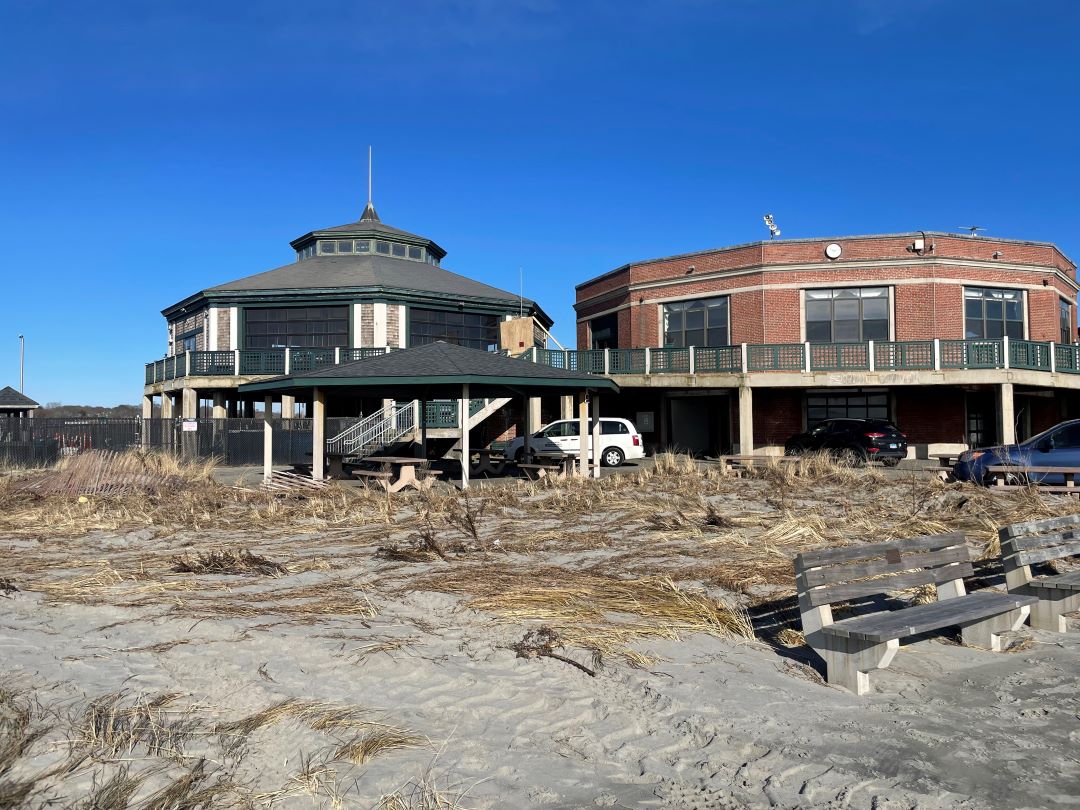‘We Were Warned:’ Rhode Island and Sixth IPCC Climate Report
September 2, 2021
“It is getting increasingly dire,” Sen. Sheldon Whitehouse, D-R.I. said in an Aug. 9 speech on the Senate floor about climate action, hours after the release of the U.N.’s Intergovernmental Panel on Climate Change’s (IPCC) Sixth Assessment Report.
“We were warned and warned and warned. We ignored it and ignored it and ignored it — and now we’re in it,” he continued. “We can make it less bad, but parts are irreversible.”
Lifting a map of the northern reaches of Narragansett Bay to the stand, Whitehouse pointed to the areas of Rhode Island predicted to disappear under rising seas by 2100.
“This is a place called Warwick Neck. It becomes Warwick Neck Island,” he said.
Barrington? An island, he continued. Bristol? An island. Poppasquash Point? Two islands.
“We stop being Rhode Island,” he said, bluntly. “We become the Rhode Island Archipelago.”
The report
In early August, the IPCC released a 3,000-plus-page report — and a 42-page summary for policymakers — compiled by more than 200 authors and referencing some 14,000 scientific papers. The Sixth Assessment Report (AR6) details the physical science of climate change, including the latest evidence of human-influenced changes to global climate systems and improved long-term climate models.
The report, which will be followed by two additional reports and an AR6 synthesis in 2022, show human influence has unequivocally warmed the atmosphere, ocean and land — and widespread, unprecedented changes have already occurred.
Global warming of 1.5 degrees Celsius and 2 degrees Celsius will be exceeded by 2100 unless drastic cuts to carbon dioxide and other greenhouse-gas emissions are made. Even at a 1.5-degree increase, unprecedented extreme events will increase in frequency. If no action is taken, temperatures will continue to rise with discernibly greater impact at every increment of warming.
Models show the Northeast locked into sea-level rise of nearly a foot by 2050. Average precipitation, extreme rainfall and flooding, too, will increase.
But the report advises that there is still a sliver of time left to act. How is Rhode Island maximizing its time?
The takeaways
“The IPCC report really makes it clear that we’re all really in the same storm together,” said Sue AnderBois, climate and energy program manager with The Nature Conservancy in Rhode Island. “We might all be in slightly different boats — some people are in luxury yachts, some people are in leaky boats — we’re all in this crazy terrible storm together.”
The report is a call for collective and decisive action, according to AnderBois. It is past time for “political jockeying,” she said, and time to mobilize with urgency. Already, the state is heating up and flooding more frequently.
“These aren’t theoretical changes,” AnderBois said. “This is not new or surprising. We are running out of time. It’s been urgent to act for a long time and I think this latest report shows how much things are accelerating even more than we thought they would.”
For Rep. Lauren Carson, D-Newport, the report is confirmation of the obvious problem in front of us.
“Look around,” she said.
Carson said the climate crisis is everywhere, from heat waves in the Middle East to wildfires in California to erosion on Aquidneck Island. The report quantifies the changes, she said, but it is nothing new.
“For people who have been engaged in climate discussions … this is exactly what we said was going to happen,” Carson said. “So that is the most important takeaway from the report.”
According to Priscilla De La Cruz, senior director of government affairs for the Audubon Society of Rhode Island, the IPCC report reiterates climate change as an increasing and accelerating threat to birds and other wildlife. She said habitats, food chains, pollinators, blooming seasons, and species interactions will be irreversibly altered.
These ecological changes, she added, go hand in hand with the growing “vulnerability of the Ocean State, our economy, and our communities.”
“Nature and science are telling us we have to wake up and must act now to limit the impacts of climate change,” De La Cruz said.
The action needed
For legislators and climate advocates alike, there is a lot to talk about when it comes to Rhode Island’s Act on Climate (AOC) law, sponsored by Carson and signed by Gov. Dan McKee in April. A framework to mandate and enforce targets on greenhouse-gas emissions, the legislation is widely viewed as a realistic environmental fitness routine that can shape up the state.
The AOC is “a really big step,” according to Rep. Michelle McGaw, D-Portsmouth, but she also noted a multipronged approach is needed. She is pushing for action on the regional Transportation & Climate Initiative (TCI) and working to develop better options for public transit, green transport and electric-vehicle infrastructure.
The Nature Conservancy has joined other advocates in pushing for the implementation of the “strong plan” laid out in the AOC, AnderBois said. The organization is also actively supporting increased renewable energy goals, the TCI and the Save The Bay-supported climate resiliency fund.
Through a partnership with the Rhode Island Infrastructure Bank, The Nature Conservancy has helped about half of the state’s municipalities identify climate hazards, lay out resiliency strategies and fund the work.
But AnderBois noted “there is just not the commensurate amount of funding at the state level,” which is holding back the large-scale rollout of projects designed to mitigate the impacts of the climate crisis.
The Audubon Society of Rhode Island, too, is pushing for climate change mitigation policies and regulations, including the AOC, according to De La Cruz. The nationwide organization has also implemented science-based education and advocacy drives, mobilized Audubon members, and introduced climate resiliency practices on its refuges.
“There is not one solution and the crisis calls for an all-hands-on-desk response,” De La Cruz said.
In an Aug. 16 statement, Fred Mattera, executive director of the Commercial Fisheries Center of Rhode Island, cited the IPCC report as a motivation to investigate and mobilize the seafood industry toward “fishery-friendly climate solutions.”
“Fishermen are eager to collaborate with others to promote equitable, sensible climate solutions that meet the scale of the problem,” wrote Mattera, noting the center’s apprehension regarding offshore wind energy. “We welcome any and all interested stakeholders to join us in a spirit of collaboration to tackle the crisis of this generation together.”
The roadblocks
During an Aug. 25 discussion on the IPCC report, the state’s Executive Climate Change Coordinating Council (EC4) flagged current staffing limits as a major barrier to climate action.
Hank Webster, staff attorney and Rhode Island director for the Acadia Center who presented before the EC4 with De La Cruz, recommended at least four full-time employees be hired or reassigned by the Department of Administration to “work specifically” on Act on Climate goal implementation.
Without additional employees, the state will not be able to implement and build on the AOC, he said.
“There’s like one person in all of state government with climate change in their title, and they’re not in charge of this plan,” AnderBois said. “It’s urgent that we staff up in a way that helps us really address this issue and empower the agencies who are going to have to tackle it.”
An additional missing piece, from De La Cruz’s vantage point, is the money to make it happen. There’s “big economic opportunity” there, she said, in investing in a more sustainable and resilient economy.
“We have to consider the cost of not addressing [climate change],” McGaw said, “and I think that that’s a really important part of the conversation that is often missed.”
Part of that is getting funding down to on-the-ground, municipal-level green infrastructure and climate resiliency projects, according to McGaw, such as Save The Bay’s Ocean State Climate Adaptation and Resilience (OSCAR) Fund.
The fund is a good model to get money out to climate resiliency projects, AnderBois noted, but the initiative’s funding mechanism — a $0.05 per barrel fee on petroleum products imported by ship into Rhode Island — was stripped from the fiscal 2021 budget.
More work also needs to be done to protect forestland in the rush to develop renewable energy, according to De La Cruz. The mass rollout of renewable energy is necessary to meet Rhode Island’s greenhouse-gas reduction goals, she said, but these projects need to be carefully sited to limit their impact on the environment.
“We need to ensure that we’re carefully siting these developments through good planning and the necessary stakeholder input to have the least impact possible,” De La Cruz said.
On a more general note, AnderBois said, policymakers need to start looking at climate change as a cross-sector issue. She noted it is a transportation issue as much as it’s an energy issue, a DEM problem as much as a planning problem.
She also said climate justice and racial equity need to be a central concern, not an afterthought.
“When we talk about climate change, we often forget about the people component of it,” AnderBois said.
The start
“My fear is that a report of this nature intimidates people,” Carson said of the IPCC’s most-recent assessment. Massive global-scale reports, which Carson admitted she hasn’t read fully, can make the average person turn off and turn away from the problem.
But there are many things the public can do, De La Cruz said, from avoiding pesticides and reducing their carbon footprint to mobilizing and holding elected officials accountable.
“It’s an emergency,” AnderBois said. “We need to be acting on it in the same way we are acting on other things that we think are major emergencies.”
Editor’s note: ecoRI News reached out to seven Republican lawmakers for comment. None provided a response.




End the development of any new fossil fuel facilities.
Place much higher taxes on fossil fuels
Fund and promote mass transit
Tax jet fuels at a much higher rate
start retreating from the shoreline
Cover every parking lot in the state with solar panels
Insulate every home in the state and put in heat pumps, starting with low income neighborhoods
Fund full time state and municipal climate positions
Plant shade trees in all low income neighborhoods
B an auto0mobiles in downtowns and rapidly transition to electric cars
And that is just for starters